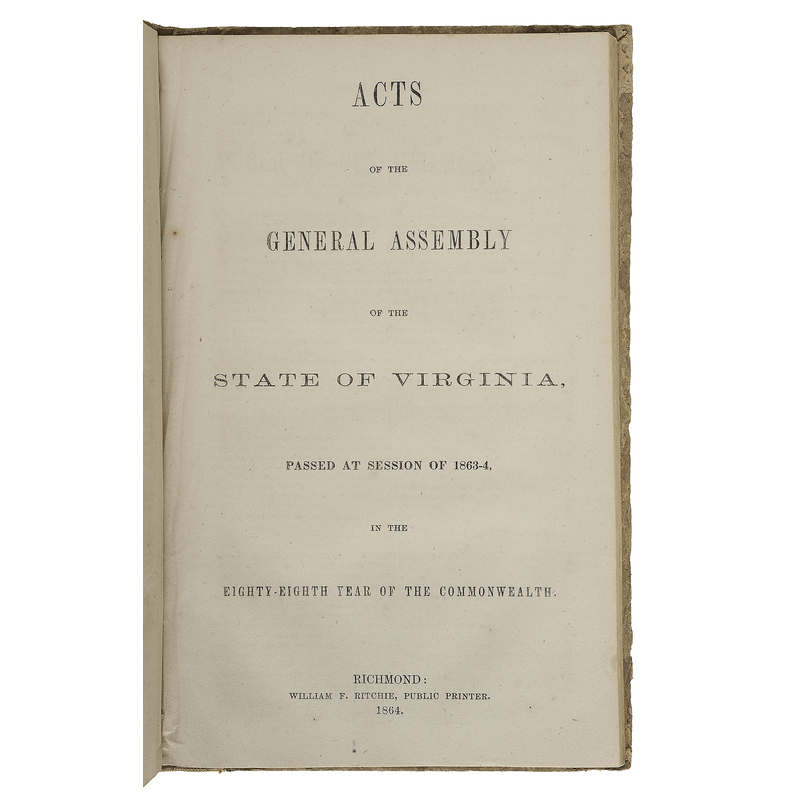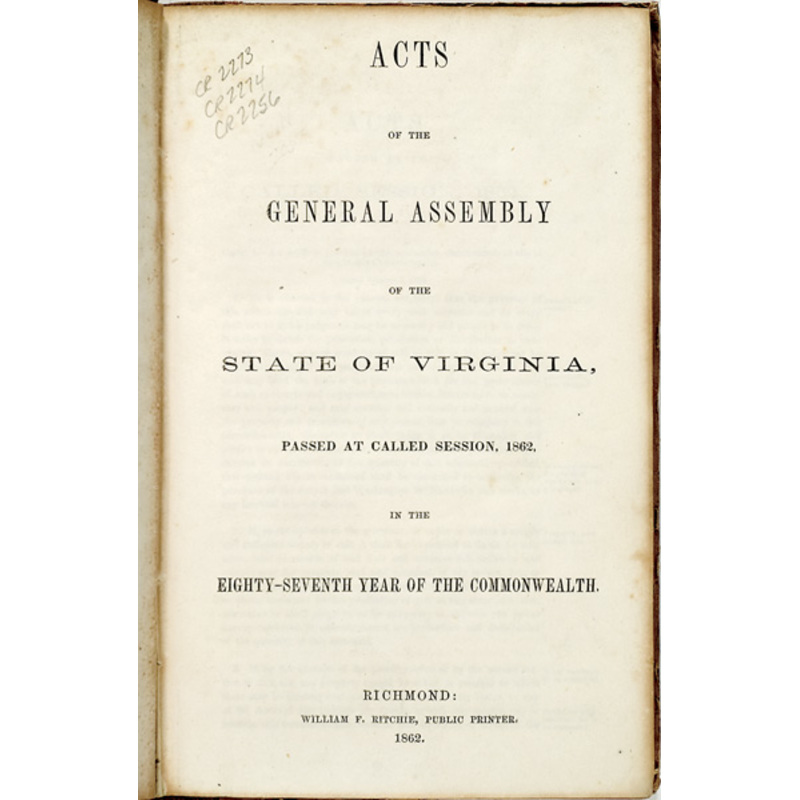Virginia General Assembly Virginia Laws: Acts Passed at a General Assembly of the Commonwealth of Virginia, October 17, 1785. Richmond: John Dunlap and James Hayes, [1786] Folio (318 x 190). Title-page a trifle frayed on bottom margin, light toning. Bound to style in contemporary Dutch comb marbled paper wrappers; rubbed. Black morocco folding-case. “Almighty God hath created the mind free.” The Acts of the Virginia legislature for 1785, containing the first official printing of one of Jefferson’s finest accomplishments: “An Act for Establishing Religious Freedom.” The authorship of this Act is one of the three things Jefferson chose to have memorialized on his tombstone, along with the writing of the Declaration of Independence and the founding of the University of Virginia. As the Jefferson Papers succinctly states: “as the Declaration of Independence asserted the natural right of people to choose any form of government conducive to their safety and happiness, so the bill for Establishing Religious Freedom asserted the natural right of a person to choose his beliefs and opinions free of compulsion.” Jefferson’s vindication of religious and intellectual freedom was first drafted in 1779. He twice introduced the bill to the Legislature, which twice failed. In the fall of 1785, while Jefferson was Ambassador in France, James Madison renewed the effort to pass the bill. He introduced it in the House of Delegates on 31 October, and by December Madison was able to write James Monroe that the bill “got thro’ the H. of Delegates, though not without warm opposition.” A process of amendment and negotiation with the Senate then followed, resulting in some significant changes in wording, to which Madison agreed, noting “they made the style less elegant, though the sense is not affected.” The final bill was enacted into law on 16 January 1786. Madison wrote Jefferson: “I flatter myself we have in this country extinguished forever the ambitious hope of making laws for the human mind.” Jefferson’s text, as enacted, opens with the ringing phrase: “Almighty God hath created the mind free.” The text then argues for freedom of religious worship. He called for a separation between church and state, a concept that would influence later legal landmarks such as the Bill of Rights. It dis-established the Church of England in Virginia and guaranteed freedom of worship to all dominations, including those of Catholics and Jews, as well as to the Protestant sects. Jefferson states: “no man shall be compelled to frequent or support any religious worship, or ministry whatsoever … nor shall otherwise suffer, on account of his religious opinions or belief … and do declare that the rights hereby asserted are the natural rights of mankind. …” Curiously, the actual statute as passed, in which Jefferson took such pride, was not the version he later promulgated to the world. Later in 1786, he had printed in Paris an appendix to the first edition of Notes on the State of Virginia, a version of the act that is a hybrid between his original 1779 text and the act as passed. This text was the basis for translations, and was reprinted in later editions of Notes, making it more broadly available than the actual statute first printed here. Rare, only six American institutions hold copies: the Library of Congress, New York State Library, Duke University, the College of William & Mary, Virginia State Library and the University of Virginia. PROVENANCEJ. Hughes (contemporary signature on title-page) and one other (indecipherable) REFERENCECelebration of My Country 107; ESTC W14113; Evans 20104; Federal Hundred 8; Swem 7460
Virginia General Assembly Virginia Laws: Acts Passed at a General Assembly of the Commonwealth of Virginia, October 17, 1785. Richmond: John Dunlap and James Hayes, [1786] Folio (318 x 190). Title-page a trifle frayed on bottom margin, light toning. Bound to style in contemporary Dutch comb marbled paper wrappers; rubbed. Black morocco folding-case. “Almighty God hath created the mind free.” The Acts of the Virginia legislature for 1785, containing the first official printing of one of Jefferson’s finest accomplishments: “An Act for Establishing Religious Freedom.” The authorship of this Act is one of the three things Jefferson chose to have memorialized on his tombstone, along with the writing of the Declaration of Independence and the founding of the University of Virginia. As the Jefferson Papers succinctly states: “as the Declaration of Independence asserted the natural right of people to choose any form of government conducive to their safety and happiness, so the bill for Establishing Religious Freedom asserted the natural right of a person to choose his beliefs and opinions free of compulsion.” Jefferson’s vindication of religious and intellectual freedom was first drafted in 1779. He twice introduced the bill to the Legislature, which twice failed. In the fall of 1785, while Jefferson was Ambassador in France, James Madison renewed the effort to pass the bill. He introduced it in the House of Delegates on 31 October, and by December Madison was able to write James Monroe that the bill “got thro’ the H. of Delegates, though not without warm opposition.” A process of amendment and negotiation with the Senate then followed, resulting in some significant changes in wording, to which Madison agreed, noting “they made the style less elegant, though the sense is not affected.” The final bill was enacted into law on 16 January 1786. Madison wrote Jefferson: “I flatter myself we have in this country extinguished forever the ambitious hope of making laws for the human mind.” Jefferson’s text, as enacted, opens with the ringing phrase: “Almighty God hath created the mind free.” The text then argues for freedom of religious worship. He called for a separation between church and state, a concept that would influence later legal landmarks such as the Bill of Rights. It dis-established the Church of England in Virginia and guaranteed freedom of worship to all dominations, including those of Catholics and Jews, as well as to the Protestant sects. Jefferson states: “no man shall be compelled to frequent or support any religious worship, or ministry whatsoever … nor shall otherwise suffer, on account of his religious opinions or belief … and do declare that the rights hereby asserted are the natural rights of mankind. …” Curiously, the actual statute as passed, in which Jefferson took such pride, was not the version he later promulgated to the world. Later in 1786, he had printed in Paris an appendix to the first edition of Notes on the State of Virginia, a version of the act that is a hybrid between his original 1779 text and the act as passed. This text was the basis for translations, and was reprinted in later editions of Notes, making it more broadly available than the actual statute first printed here. Rare, only six American institutions hold copies: the Library of Congress, New York State Library, Duke University, the College of William & Mary, Virginia State Library and the University of Virginia. PROVENANCEJ. Hughes (contemporary signature on title-page) and one other (indecipherable) REFERENCECelebration of My Country 107; ESTC W14113; Evans 20104; Federal Hundred 8; Swem 7460















Try LotSearch and its premium features for 7 days - without any costs!
Be notified automatically about new items in upcoming auctions.
Create an alert